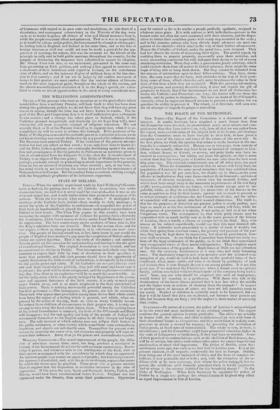TIIE POLICE OF THE METROPOLIS.
NEW TIMES—TIIC Report of the Committee is a document of some interest. It would, however, have required a much longer time than the Committee have devoted, an examination much more minute and com- prehensive than they have entered on, and, from all that we can gather from the report, more consideration of the subject both inn its history and bearings than the Committee seem to have brought to their task, to have given a complete view of the causes and mires of the crimes of this great city. In the first place, we think the opinion that crime, is on the increase inn the me- tropolis is extremely unfounded. During one or two years, from scarcity of labour inn the country, there may have been an increase of strangers in Lon- don, without home, or friends, or motley, and petty thefts may have in- creased in consequence ; but taking not years but periods, no fact is more certain than that the worst parts of London are now safer than the best were fifty years ago. The criminal commitments are, of all other tests, the most uucertain. When the Committee lament that no means will bring back the population of Londan to the same moral soundness that they exhibited when the population WaS 36 per cent. less, we should say to them—make your officers as ineffective as they were then—restore these thousands, and tens of thousands, of obscure receptacles, where vice lay securely hidden, and which have been swept away in the numerous improvements of the last forty or fifty years—extinguish the gas lamps, which render escape next to inn- pasible, while, as they do not lighten the necessities of tine thieves in the same proportion as they do their haunts, operate not so much to prevent as to detect attempts'at spoliation—let the Committee do this, and the tables of committals will soon shrink into their wonted dimensions. The truth is, that for the purposes of detection our present police is nearly perfect, per- haps as much so as the free institutions of the country will bear, while for the purposes of prevention it is nearly, if not quite, as bad as it was when Colquinoun wrote. The ccnsequence is, that while petty crimes may be committed with as much facility now as inn the worst periods of the history of London, there is hardly a chance of escape left to the thief. Men, wino reason on the subject superficially, would say that this must diminish rob- beries. If robberies were prosecuted as a matter of trade it would; but while they spring from constant causes, tine poverty and passions of the par- ties, they may he kept down by repression, but never by punishment, how- ever swift or severe. As we think the Committee have formed too hasty no- tions of the legal criminality of the public, so do we think they entertained very exaggerated views of their moral delinquencies. They complain much of the drunkenness of the populace. Englishmeu of 1828 are not a drunken race. On the contrary, drunkenness is a rare vice, anti daily becoming rarer. The landatores ternporis acti, who moralise over the increased con- sumption of gin, would do well to look back on the good old times of their childhood, when more spirits and wine were drunk by gentlemen of rank and fortune than is now thought decent men among porters. It is not fifty years ago, if we may trust the Chroniclers, when a dinner, CtiCH ill a private family, seldom concluded without three-fourths of the company being inebri- ated. Now, any one who should be surprised into sucin an impropriety, would forfeit his standing as a gentleman. Will those who talk of the drunkenness of the lower classes pretend that it was less when the middle and the higher were so zealous in showing them the example ? In respect to another cause of increase of crime, we have not left ourselves room to say much. Neglect of children is certainly much to be lamented, but we fear it will be found that they are neglected, not because their parents are idle, but because they arc busy; that the neglect is more matter of necessity
than choice. •
STANDARD—By universal consent, the police of London is acknowledged to be the worst and most inefficient in any civilized country. This report confirms the general opinion in every particular. The officers are actually in league with tine thieves, and other malefactors--they mix with them in their abandoned haunts as companions, and they assist them in making com- promises to obtain a reward for roguery, by procuring the restitution of stolen goods, at fixed rates of remuneration. The whole system, in short, is mischievous ; and the Committee might have proceeded somewhat higher in tine scale of delinquency or ineflicieucy, if they had been an minded. Some of their practical recommendations, such as the abolition of flash-houses, eac., will be of service, but until a total reform takes place we cannot hope for any amelioration of much vital importance. The police of Dubliu, sonic five- and-twenty years ago, was such as we tint' that of London now. It is at the present moment, in all respects, confessedly the best in Europe. Dublin, from being one of the most turbulent of cities, and the focus of constant re- bellions, is now peaceable and orderly ; and, with the exception of the se- ditious club at its corn exchange, over whom the police unhappily has no power, the rebellious spirit formerly prevalent there is totally suppressed. And to whom is the country indebted for this beneficial change ? To the Duke of Wellington. When Irish Secretary he regulated the police of Dublin by a single act : perhaps his administration in England may effect an equal improvement in that of London.


















 Previous page
Previous page